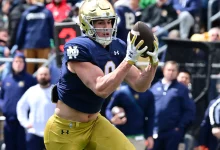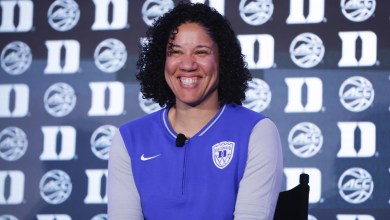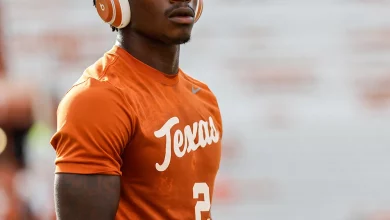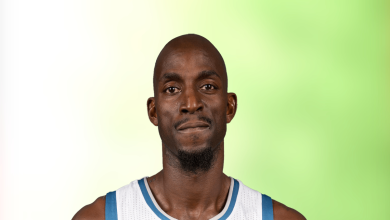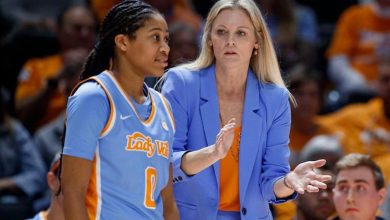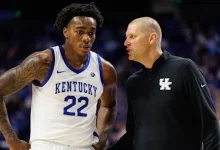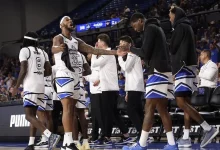Notre Dame Coach Marcus Freeman Eager for USC Showdown: ‘Bring on USC. When? I Don’t Care.
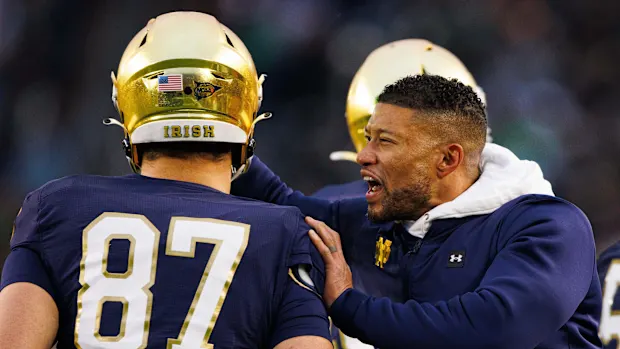
Few rivalries in college football carry the weight, tradition, and intensity of Notre Dame vs. USC. It’s a game that stretches beyond touchdowns and tackles — it’s about pride, legacy, and generational bragging rights. And for Notre Dame head coach Marcus Freeman, it’s a game that can’t come soon enough.
In a passionate statement that has already made waves among Irish faithful and college football fans nationwide, Freeman declared, “Bring on USC. When? I don’t care.” This no-nonsense proclamation captures not only the coach’s competitive spirit but also his deep respect for one of the sport’s greatest rivalries.
As the 2025 college football season approaches, Freeman’s message sets the tone for what promises to be another thrilling chapter in a series that has captivated fans for nearly a century. But beyond the soundbite lies a deeper story: one of tradition, preparation, and a head coach embracing the responsibility of upholding Notre Dame’s football legacy.
A Rivalry Forged in History
The Notre Dame–USC rivalry began in 1926, born out of mutual respect between Knute Rockne and USC officials. Over time, it grew into something iconic. The matchup between South Bend and Southern California offers more than a clash of styles — it’s a coast-to-coast battle rich in prestige and fueled by decades of unforgettable moments.
Legends like Joe Montana, Reggie Bush, Tim Brown, Matt Leinart, and Charles White have all etched their names into this rivalry’s lore. The Jeweled Shillelagh, awarded to the victor, is symbolic of the tradition and pride each school pours into the matchup.
What makes this rivalry particularly special is its consistency. Outside of a short break during the COVID-19 pandemic, Notre Dame and USC have played nearly every year since the series began. Despite conference realignment, playoff expansion, and scheduling complications, the commitment to this game endures.
Marcus Freeman: Embracing the Moment
Since taking over as head coach in 2021, Marcus Freeman has embraced every aspect of Notre Dame’s culture — from its academic rigor to its unmatched football traditions. His energy, charisma, and defensive acumen have quickly made him a favorite among fans, players, and alumni.
Freeman isn’t just coaching football at Notre Dame — he’s stewarding a legacy. And the USC rivalry is a pillar of that legacy.
When Freeman says, “Bring on USC. When? I don’t care,” it’s not just bravado — it’s a reflection of his understanding of what this game means to the Notre Dame community. It means everything. Whether it’s played in September or November, in Los Angeles or South Bend, Freeman’s message is simple: the Fighting Irish will be ready.
Building a Team Ready for the Moment
Part of what makes rivalries great is how they push programs to prepare at the highest level. Freeman has focused on building a disciplined, tough, and fundamentally sound football team — one capable of contending with the speed and explosiveness of teams like USC.
Freeman’s defenses have consistently been among the best in the country. As a former linebacker, he understands the importance of playing with intensity and discipline — traits that are magnified under the bright lights of rivalry games. He’s recruited hard, emphasizing not only athleticism but also leadership and character.
Notre Dame’s recent recruiting classes have brought in blue-chip talent across the board. With an emphasis on player development and a strong strength and conditioning program, Freeman is constructing a roster that can not only beat USC but compete for national titles.
USC Under Lincoln Riley: A High-Octane Foe
If Marcus Freeman is building Notre Dame with grit and discipline, Lincoln Riley’s USC is built on explosiveness and creativity. Since arriving in Los Angeles, Riley has brought a dynamic offense that lights up scoreboards, highlighted by Heisman-level quarterback play and elite receiving talent.
This contrast in styles adds another layer to the rivalry. Notre Dame’s defense-first identity under Freeman versus Riley’s offensive fireworks creates matchups that are as strategic as they are emotional.
Freeman has shown respect for USC’s program, noting the challenge they present each year. But respect doesn’t mean fear. His comments — “When? I don’t care” — reflect a confidence that Notre Dame can meet the challenge, no matter the timing or setting.
Why Timing Doesn’t Matter
Freeman’s comment also underscores a broader truth: for great rivalries, it’s not when you play — it’s that you play. In an era where conference realignment and playoff expansion have disrupted traditional schedules, there’s growing concern that historic rivalries might fade or lose significance.
Freeman’s stance is a direct rebuttal to that idea. To him, the Notre Dame-USC rivalry is timeless. Whether the game kicks off in early October or caps off the regular season in late November, its importance remains unchanged.
Fans feel the same. Whether tailgating under golden domes or palm trees, they circle the date on the calendar every year. For alumni, it’s a weekend of reunions. For players, it’s a game they dream about long before they wear the uniform.
The Rivalry’s National Impact
Notre Dame vs. USC isn’t just a game — it’s a national event. Broadcast to millions across the country, it often carries playoff implications and Heisman moments. It’s one of the rare non-conference rivalries with legitimate national stakes.
Freeman understands that this game is a recruiting tool, a measuring stick, and a branding opportunity all wrapped into one. It’s a game where legacies are built — both individual and institutional.
By leaning into the rivalry, Freeman is tapping into the passion that fuels college football. His fire, authenticity, and competitive edge resonate with players who want to be part of something bigger than themselves.
A Statement to Recruits and Rivals
Freeman’s comments also serve as a message to recruits — and rivals. He’s telling future Fighting Irish that if they come to Notre Dame, they’ll play in the biggest games, on the biggest stages, against the best teams.
He’s also telling USC and others that Notre Dame doesn’t shy away from any challenge. That confidence, when backed by preparation and performance, becomes a powerful motivator and rallying cry for the locker room.
Fan Reaction and Media Buzz
Unsurprisingly, Freeman’s quote has been embraced by the Notre Dame faithful. Social media exploded with support, and former players and alumni applauded the mindset.
Fans see it as a return to the fire and pride that have defined Notre Dame’s best eras. They want a coach who embraces the pressure, relishes the rivalries, and fights for every inch. In Freeman, they see exactly that.
Looking Ahead to the 2025 Matchup
As the next Notre Dame-USC game looms, all eyes will be on how the Irish respond to their coach’s challenge. Will they rise to the occasion? Will Freeman notch another signature win?
One thing is certain: the players will be motivated. The coaches will be prepared. And the fans will be loud. Whether in the Coliseum or at Notre Dame Stadium, the intensity will be electric.
Marcus Freeman’s declaration — “Bring on USC. When? I don’t care.” — is more than a bold soundbite. It’s a philosophy. It’s a signal that he understands Notre Dame’s mission, respects its past, and is ready to lead it into the future.
For a rivalry that has defined so much of college football history, it’s heartening to see a head coach who embraces its meaning. Under Freeman, Notre Dame isn’t just playing football. It’s playing for legacy, pride, and tradition.
And when it comes to USC — it doesn’t matter when. What matters is that the battle lives on.


